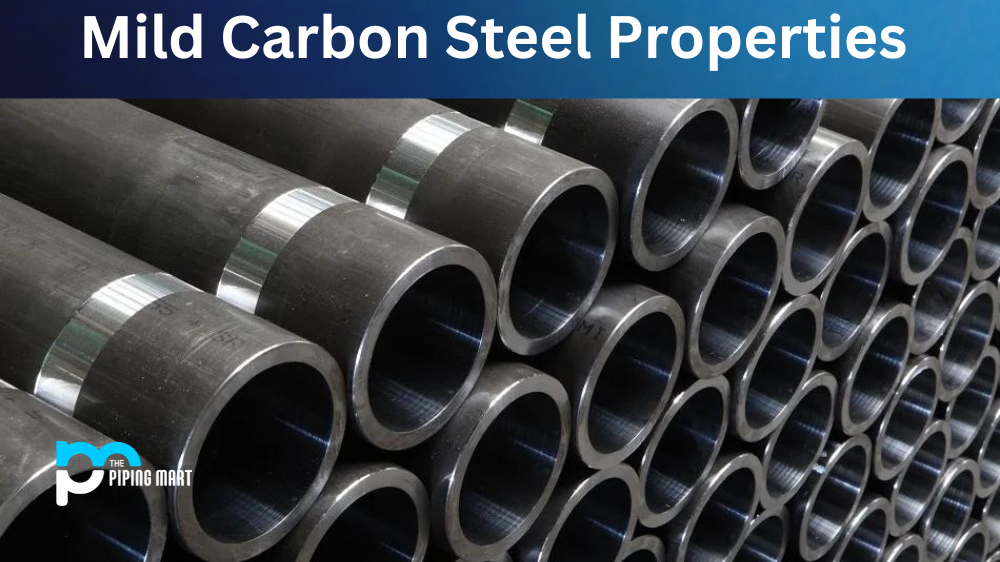If you’re planning to build something out of mild carbon steel, it’s important to understand the properties of this material. Mild carbon steel is a form of low-carbon steel that has a higher content of manganese than other forms. This makes the material more ductile and harder than other forms of low-carbon steel. For those in the engineering industry, understanding mild carbon steel properties can help make sure your product meets its specifications.
Physical Properties
When it comes to physical properties, mild carbon steel usually has a tensile strength between 400-600 N/mm2 (MPa), with a yield strength that’s approximately 250 N/mm2 (MPa). It also often has an elongation between 10-30%. In terms of hardness, mild carbon steel usually falls between 120 HB and 170 HB on the Brinell scale test. Other physical properties include density (7.85g/cm3) and thermal conductivity (60W/mK).
Density
The density of mild carbon steel is typically between 7.85 g/cm3 (0.284 lb/in3) and 8.05 g/cm3 (0.291 lb/in3).
Melting point
Mild carbon steel has a melting point range of 1430-1510°C (2600-2750°F).
Hardness
Mild carbon steel can be hardened by quenching in water or oil, but it is not as hard as high-carbon steel.
Strength
Mild carbon steel has a Tensile Strength of 60,000-80,000 psi (410-550 MPa) and a Yield Strength of 30,000-40,000 psi (210-280 MPa).
Ductility
Mild carbon steel is ductile, meaning that it can be drawn into wire or formed into sheets or other shapes without breaking.
Chemical Properties
Mild carbon steel also has different chemical properties than other types of low-carbon steel. The most common alloying elements found in mild carbon steel are manganese and silicon, although some others, such as aluminum or phosphorus, are sometimes present as well. The typical composition is 0.15–0.3% Carbon, 0.6–1% Manganese, 0.05–0.25% Silicon, and up to 0.04% Phosphorus, depending on its grade type and heat treatment process used in production.
Chemical Composition
Mild carbon steel typically contains between 0.16 and 0.29 percent carbon, as well as small amounts of manganese, sulfur, phosphorus, and silicon.
Physical Properties
Mild carbon steel has a density of 7.85 g/cm3 (0.284 lb/in3), a melting point of 1425-1527 degrees Celsius (2595-2761 degrees Fahrenheit), and a boiling point of 2900 degrees Celsius (5272 degrees Fahrenheit).
Tensile Strength
Mild carbon steel has a tensile strength of 370-500 MPa (53-73 ksi). This means that it can withstand a force of up to 370-500 megapascals (53-73 kilopounds per square inch) before breaking or deforming.
Yield Strength
The mild carbon steel also has a yield strength of 235 MPa (34 ksi), meaning that it can support a load of up to 235 megapascals (34 kilopounds per square inch) without permanently deforming.
Elongation
Mild carbon steel has an elongation of 20-30 percent. This means that it can be stretched up to 20-30 percent of its original length without breaking or deforming.
Mechanical Properties
The mechanical properties of mild carbon steel depend on its heat treatment process – either annealing or quenching – but generally speaking it is more ductile than other forms of low-carbon steels and can handle higher stress levels without breaking or fracturing easily compared to other materials like aluminum or titanium alloys. It also has higher corrosion resistance due to its ability to form protective layers on its surface when exposed to air or water—this is known as “passivation,” which helps increase the life span of any metal part made from it.
Ductility
One of the most important mechanical properties of mild carbon steel is its ductility. Ductility is a measure of a material’s ability to deform under tensile stress. Mild carbon steel has good ductility, meaning that it can be easily formed into various shapes without breaking.
Tensile Strength
Another important mechanical property of mild carbon steel is its tensile strength. Tensile strength is a measure of a material’s ability to resist being pulled apart by forces acting on it. Mild carbon steel has good tensile strength, meaning that it can resist being pulled apart by forces acting on it.
Yield Strength
Yield strength is a measure of a material’s ability to resist being deformed by forces acting on it. Mild carbon steel has good yield strength, meaning that it can resist being deformed by forces acting on it.
Impact Strength
Impact strength is a measure of a material’s ability to resist being damaged by forces acting on it. Mild carbon steel has good impact strength, meaning that it can resist being damaged by forces acting on it.
Hardness
Hardness is a measure of a material’s resistance to being scratched or dented. Mild carbon steel has good hardness, meaning that it resists being scratched or dented.
Conclusion:
Overall, mild carbon steel is a great option for many engineering projects because it offers good mechanical strength while still being relatively inexpensive compared to other materials like aluminum alloys or titanium alloys that have similar strength levels but come with much bigger price tags associated with them due to their rarity and difficulty in manufacturing parts from them at scale. Its combination of physical, chemical, and mechanical properties make it suitable for many applications where additional strength or corrosion resistance is required without making too big an impact on cost – making mild carbon steel one of the most popular metals used by engineers today!

Meet Bhavesh, a seasoned blogger with a wealth of knowledge and experience. From metal products manufacturing to retail, Bhavesh has a diverse background in various industries and is dedicated to sharing his insights and expertise with readers.




